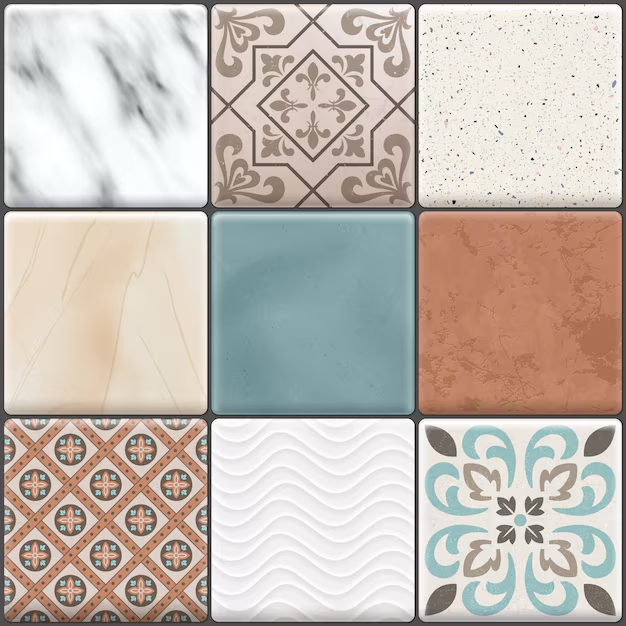Ceramic Tiles
Ceramic tiles come in various types, each with its own characteristics and uses:
Porcelain Tiles:
Made from dense clay fired at high temperatures, porcelain tiles are extremely durable and water-resistant. They're suitable for both indoor and outdoor use and are ideal for high-traffic areas.
Ceramic Tiles:
These tiles are made from clay mixed with other materials and are less dense than porcelain tiles. They come in various finishes like matte, glossy, and textured, and are versatile for different design styles.
Terracotta Tiles:
Terracotta tiles are made from fired clay and are known for their warm, rustic appearance. They're often used indoors for a natural, earthy look but require sealing to prevent water absorption and staining.
Mosaic Tiles:
These small tiles are typically made from ceramic or glass and come in intricate patterns. They're popular for adding visual interest to backsplashes, accent walls, and shower floors.
Quarry Tiles:
Quarry tiles are made from clay and are unglazed, giving them a natural, rustic appearance. They're durable and suitable for both indoor and outdoor use, often used for flooring in kitchens, patios, and entryways.
| "BEST BUILDER FLOOR APARTMENT IN CHENNAI" |
Glazed Tiles:
Glazed ceramic tiles have a protective layer of liquid glass applied to the surface before firing, giving them a glossy finish and making them more resistant to stains and scratches. They come in a wide range of colors and patterns.
Cement Tiles:
Cement tiles are made from a mixture of cement, sand, and pigments pressed into molds and cured. They're known for their intricate patterns and are suitable for floors, walls, and even outdoor spaces.
Advantages Of Ceramic Tiles
Durability:
Ceramic tiles are highly durable and resistant to scratches, stains, and wear, making them suitable for high-traffic areas.
Water Resistance:
Most ceramic tiles are naturally water-resistant, making them ideal for use in wet areas like bathrooms, kitchens, and laundry rooms.
Low Maintenance:
They are easy to clean and require minimal maintenance to keep them looking new. Regular sweeping and occasional mopping are usually sufficient to maintain their appearance.
Versatility:
Ceramic tiles come in a wide range of colors, sizes, shapes, and patterns, allowing for endless design possibilities. They can be used to create various styles, from modern to traditional, and can mimic the look of natural materials like stone or wood.
Cost-Effectiveness:
Compared to other flooring options like hardwood or natural stone, ceramic tiles are often more affordable. They offer a durable and stylish flooring solution at a lower cost.
Health and Safety:
Ceramic tiles are inhospitable to dust mites, mold, and bacteria, making them a healthier choice for indoor environments. Additionally, they are fire-resistant and do not emit harmful VOCs (volatile organic compounds), contributing to better indoor air quality.
Environmentally Friendly:
Many ceramic tiles are made from natural materials like clay and sand and can be recycled at the end of their lifespan. They are also energy-efficient to produce, requiring less energy than other flooring materials like hardwood or carpet.
Uses Of Ceramic Tiles
Flooring:
Ceramic tiles are commonly used as flooring material in both residential and commercial spaces. They are durable, easy to clean, and come in a wide range of colors and patterns to suit different design preferences.
Walls:
Ceramic tiles are often used to cover walls in kitchens, bathrooms, and other areas prone to moisture. They provide a waterproof surface that is easy to clean and maintain.
Backsplashes:
Ceramic tiles are popular choices for kitchen and bathroom backsplashes. They add visual interest and protect walls from water damage and stains.
Countertops:
While less common than materials like granite or quartz, ceramic tiles can be used for kitchen and bathroom countertops. They offer a durable and heat-resistant surface that is easy to clean.
Showers and Bathtubs:
Ceramic tiles are ideal for covering shower walls, floors, and bathtub surrounds. They are water-resistant and provide a safe and comfortable surface for bathing.
Outdoor Spaces:
Porcelain tiles, which are highly durable and weather-resistant, are often used for outdoor patios, walkways, and pool surrounds. They can withstand exposure to the elements and are easy to maintain.
Decorative Accents:
Ceramic tiles can be used to create decorative accents and focal points in interior design. They can be arranged in intricate patterns or used to create murals and mosaics.













